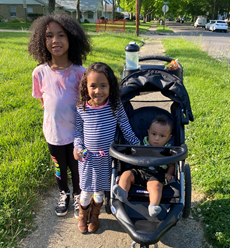Malissa has worked in the early childhood profession for over 7 years. She is currently works for a highly-rated child care center. Her goal is to help advocate for children and their families so we can utilize quality early learning experiences to help close the achievement gap.
Let’s set the scene: imagine you are a working parent and you have children who need child care. You know you cannot afford to pay for private child care as it would leave you far too little disposable income to meet the needs of your family such as food, rent, utilities, medicine, etc.
I have three children ages 7, 4, and 8 months. Private pay child care, where my children currently attend, equals to $3,700 per month in rates. That is $1,000 more than I make in a single month. I would work to pay for child care, but what is the purpose of working if I do not have any money left to pay for other necessary living expenses after I’ve paid the cost of child care? I could weigh the options of choosing a lower quality child care program or I could find someone who babysits children in their home who has no training or background in early childhood development. Who can I trust with my children? How will I know that they are receiving the early education and skills needed to be ready for school, and that they are in a safe environment? The first five years of a child’s life is a crucial time in brain development and can lay either a strong or weak foundation for that child’s future success. Child care programs that are quality-rated through Step Up to Quality are key to building this strong foundation.
I was fortunate enough to qualify for publicly funded child care six years ago when I only had one child and I made $8.25 per hour. I have kept my publicly funded child care by accepting a higher copay and taking unpaid vacations to stay within the eligibility limits. Without this support, I would have to pay more than what I earn in a single month to access child care. What if I am offered another pay raise? Will I have to choose between earning more money or staying where I am at to afford child care?
What about the less fortunate parents? Who will help their children be prepared for lifelong success? Who will provide their children quality early learning experiences?
In my role at the highly-rated child care center I work for, I have witnessed firsthand how difficult it is for families to afford quality child care as our current child care eligibility only factors gross income and not net income, leaving families with not enough income in their pockets to provide for their family. Raising the initial eligibility guidelines to 150% of the Federal Poverty Level will help offset this discrepancy and allow families who need it the most to qualify for child care assistance. If we want women to return to the workforce and advance their careers, then the initial income guidelines must increase.
Quality child care prepares children to be successful in kindergarten and beyond by providing them with quality early learning experiences and social-emotional skills. Ohio’s goal is to have children future ready by age 5. We, quality-rated child care programs, are the backbone to that future success. Ohio families cannot continue to put their careers on the line and children cannot wait any longer to access quality child care. They need relief now.
Groundwork Ohio's budget blog series features stories from child care professionals, families, business leaders, and community members on why there's an urgent need in their communities to expand access to quality child care. In the state biennial budget, Ohio legislators have the opportunity to increase eligibility for the state's publicly funded child care program from 130% of the Federal Poverty Level to 150% of the Federal Poverty Level. Read our child care budget fact sheet to learn more about why there is an urgent need to increase access to quality child care. Take action today by contacting your Senator urging their support for expanding eligibility by clicking here.





Comments